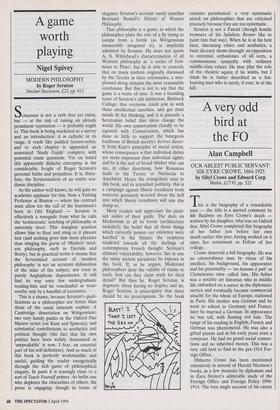A game worth playing
Nigel Spivey
MODERN PHILOSOPHY by Roger Scruton Sinclair-Stevenson, £25, pp. 611 Scrutonise is not a verb that yet exists, but — at the risk of raising an already prominent reputation — it probably ought to. This book is being marketed as a survey and an introduction: it is catholic in its range, it reads like padded lecture-notes, and to each chapter is appended an annotated 'Study Guide' complete with potential exam questions. Yet on board this apparently didactic enterprise is the considerable freight of Roger Scruton's personal faiths and prejudices. It is, there- fore, the Scrutonisation of an entire aca- demic discipline.
As the author well knows, he will gain no academic applause for this. Now a Visiting Professor at Boston — where his contract must allow for the call of the huntsman's horn in Old England — Scruton is effectively a renegade from what he calls the 'technocratic' teaching of philosophy at university level. This marginal position allows him to float and sting as it pleases him (and nothing gives him more pleasure than stinging the gurus of 'Modern' mod- ern philosophy, such as Derrida and Rorty), but in practical terms it means that the Scrutonised account of 'modem philosophy' is not an accurate delineation of the state of the subject, not even in purely Anglophone departments. It will find its way onto few . undergraduate reading-lists and be vouchsafed as trust- worthy only by a handful of eccentrics.
This is a shame, because Scruton's quali- fications as a philosopher are better than those of the usual itinerant sophist. A Cambridge dissertation on Wittgenstein; two very handy guides in the Oxford Past Masters series (on Kant and Spinoza); and substantial contributions to aesthetics and political thought (the fact that his own politics have been widely demonised as 'unspeakable' is now, I fear, an essential part of his self-definition). And so much of this book is perfectly workmanlike and useful, guiding the reader energetically through the rich game of philosophical enquiry. In parts it is teasingly close to a sort of Teach Yourself primer. As befits one who deplores the obscurities of others, the prose is engaging; though in terms of elegance Scruton's account rarely matches Bertrand Russell's History of Western Philosophy.
That philosophy is a game, in which the philosopher plays the role of a fly trying to escape from a bottle (as Wittgenstein memorably imagined it), is implicitly admitted by Scruton. He does not quote A. N. Whitehead's characterisation of all Western philosophy as 'a series of foot- notes to Plato', but he is able to concede that on many matters originally discussed by the Greeks in their colonnades, a non- plussed shrug remains the most reasonable conclusion. But this is not to say that the game is a waste of time. It was a founding tenet of Scruton's old institution, Birkbeck College, that everyone could join in with these intellectual aerobics, and get their minds fit for thinking; and it is patently a Scrutonian belief that ideas change the world. His own conservatism (hardly to be equated with Conservatism, which has done so little to support the bourgeois backbone of British society) derives direct- ly from Kant's principles of moral action, whose consequence is that individual duties are more important than individual rights; and he is the sort of broad thinker who can see, in other directions, how Rousseau leads to the Terror, or Nietzsche to Auschwitz. Hence the evangelistic tone to this book, and its attendant publicity: this is a campaign against liberal trendiness from someone genuinely worried about the hell into which liberal trendiness will one day dump us.
Many readers will appreciate the .parti- san asides of their guide. The slurs on Modernism in all its forms (architecture included); the belief that all those things which currently poison our existence were hatched in the Sixties; the suspicion tendered towards all the darlings of contemporary French thought. Scruton's ultimate vulnerability, however, lies in one the many ancient paradoxes he exposes in this book. If, as he argues, Modernist philosophers deny the validity of claims to truth, how can they claim truth for their denial? But then he, Roger Scruton, is dogmatic about having no dogma; and he, Roger Scruton, is prescriptive that there should be no prescriptions. So the book remains paradoxical: a very systematic attack on philosophies that are criticised precisely because they are too systematic.
Scruton is not a Fascist (though hostile browsers of his Salisbury Review like to paint him that way). When he is at his best here, discussing ethics and aesthetics, a basic decency shows through: an opposition to extremist orthodoxies of all sorts, a commonsense sympathy with ordinary middle-class values. He may play the role of the choleric squire if he wants, but I think he is better described as a fox- hunting man who is rarely, if ever, in at the kill.


























































 Previous page
Previous page